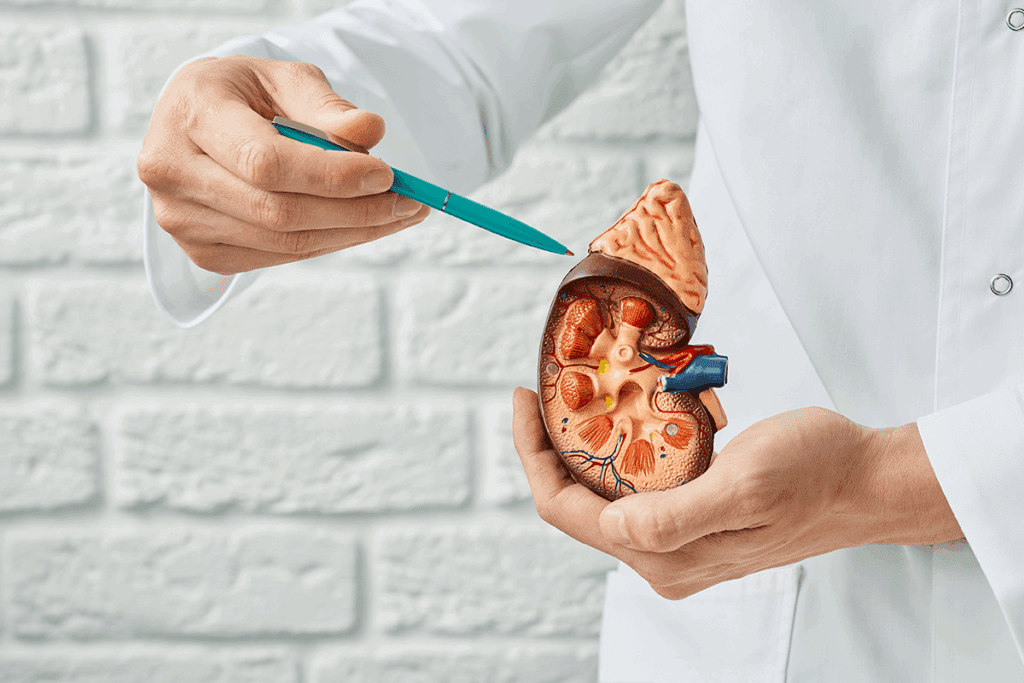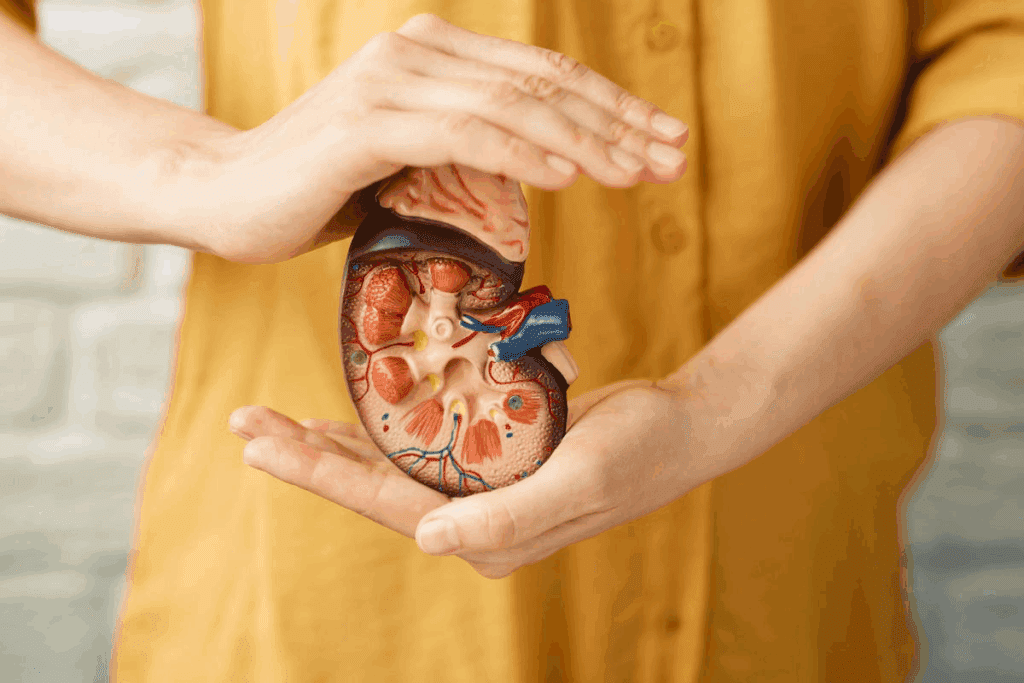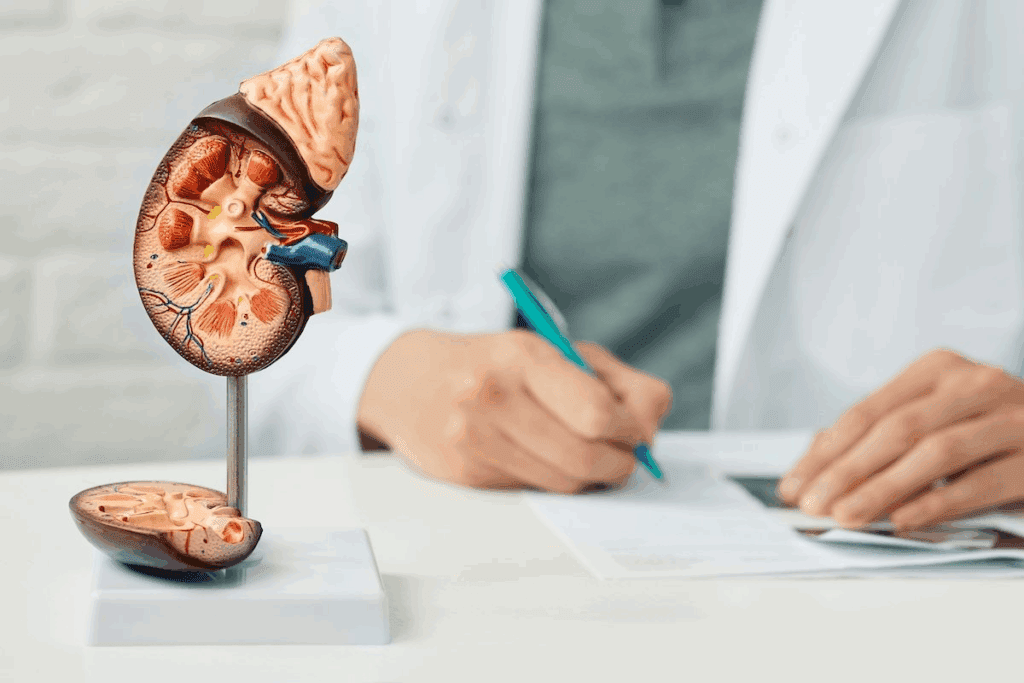
At Liv Hospital, we focus on natural remedies and their impact on health. Apple cider vinegar is often talked about for preventing or treating kidney stones. But what does science really say about its benefits and risks for kidney health?
Some people believe apple cider vinegar’s acetic acid can help. But the scientific proof for its use against kidney stones is not strong. We will look into apple cider vinegar’s makeup, possible side effects, and how to use it safely.
Understand whether does apple cider help kidney stones and its benefits for kidney health.

It’s important to know about kidney stones to manage and prevent them. These mineral deposits can cause a lot of pain and discomfort.
Kidney stones, also known as renal calculi, are hard deposits in the kidneys. They can be different sizes and shapes. Their symptoms depend on their size and where they are in the kidney.
There are several types of kidney stones, each with its own causes and risk factors. Here are the most common ones:
Several factors can increase your risk of getting kidney stones. Here are some of them:
The symptoms of kidney stones can vary. They depend on the size and location of the stone. Here are some common symptoms:

Apple cider vinegar is known for its health benefits. It contains acetic acid and other compounds. Made from apples, it’s used in cooking and for health reasons.
Apple cider vinegar is mostly acetic acid. This acid comes from a fermentation process. It turns apple cider into vinegar, making it rich in acetic acid.
It also has other active compounds. These include antioxidants, potassium, and minerals. These help with the health benefits of ACV.
Acetic acid is the main part of apple cider vinegar. It gives vinegar its smell and taste. It’s thought to have health benefits like fighting germs and helping digestion.
ACV also has antioxidants. These help fight body stress. It has potassium and minerals too, making it nutritious.
Apple cider vinegar is linked to many health benefits. It might help with weight management, blood sugar control, and digestive health. But, we need to look at the science behind these claims.
Some say it’s good for heart health and has anti-inflammatory effects. Yet, more research is needed to confirm these benefits.
Looking into apple cider vinegar and kidney stones, we need to know what’s real. Many people think ACV can help with kidney stones. They say it might dissolve or stop these painful stones from forming.
There are a few ideas on how ACV could help with kidney stones. Some think its acidity can break down stones. Others believe it might stop stones from forming by changing the body’s chemistry.
There are different ways ACV might affect kidney stones. Some ideas include:
Many people use apple cider vinegar for kidney stones, based on their own experiences. But, it’s important to separate personal stories from proven facts.
“I’ve been using apple cider vinegar for my kidney stones, and I feel like it’s helped me avoid surgery.” – Such stories are inspiring, but we need solid science to back up ACV’s benefits for kidney stones.
In summary, the stories and theories about ACV and kidney stones are interesting. But, we must carefully look at the scientific proof to really understand its benefits and limits.
Research on apple cider vinegar and kidney stones is growing. But, we need more studies to know for sure. Let’s look at what we know so far from clinical studies.
Many studies have looked into apple cider vinegar’s role in preventing kidney stones. A pilot study caught our attention. It showed vinegar might help prevent stones from coming back. But, we must understand the study’s limits.
The pilot study focused on people who often got kidney stones. It found that drinking vinegar regularly could lower the chance of stones coming back. This is good news, but we need more proof.
Even with promising results, there are big challenges in the research. Most studies have small groups and lack long-term data. We also don’t know how vinegar works to prevent stones. More research is needed.
As we keep studying apple cider vinegar and kidney health, we see some benefits. But, we need more research to be sure it’s safe and effective for preventing kidney stones.
Apple cider vinegar (ACV) has caught the eye of many for its kidney health benefits. It’s important to look at how ACV might help with kidney health in different ways.
ACV might help kidney health by changing urine pH and composition. The acetic acid in ACV could make urine less acidic. This might stop certain types of kidney stones from forming.
Research shows ACV can change urine pH. But how much it changes can vary. Some studies suggest ACV could make urine less acidic, which might prevent stones.
ACV might also prevent kidney stones. It could do this by changing urine pH and composition. Some studies look at ACV’s role in stopping stones from coming back.
Understanding how stones form and how diet affects this is key. The table below shows the main types of kidney stones and how diet might play a role:
| Stone Type | Dietary Influences |
| Calcium Oxalate Stones | High oxalate intake, low calcium intake, dehydration |
| Uric Acid Stones | High purine diet, low urine volume, acidic urine pH |
| Cystine Stones | Genetic predisposition, high cystine concentration in urine |
ACV might also help kidney function in other ways. Its antioxidants could reduce oxidative stress. This is good for keeping kidneys healthy.
While there’s not much direct proof, a healthy diet and lifestyle are key for kidneys. Adding ACV to a balanced diet could help overall health.
In summary, ACV could help kidney health in many ways. It might change urine pH, prevent stones, and support kidney function. Always talk to a doctor before trying new foods or supplements.
Apple cider vinegar (ACV) is known for its health benefits. But, using it for kidney conditions has risks. People with kidney problems need to be careful.
Drinking too much ACV can harm your kidneys. Its acidity can strain your kidneys, which is bad for those with kidney disease. It’s important to watch your kidney health if you use ACV for kidney stones.
ACV can lead to potassium loss and electrolyte imbalance. Its acetic acid can affect potassium levels. This is a big concern for those with kidney problems, as their kidneys may already have trouble balancing electrolytes.
Some people should not use ACV for kidney problems. This includes those with severe kidney disease, taking certain medications, or with a history of potassium deficiency. Always talk to a doctor before trying new remedies, like ACV, if you have kidney issues.
ACV can also interact with other medications and treatments. For example, it can worsen potassium loss when taken with diuretics or laxatives. It may also affect medications for diabetes or heart conditions. Medical advice is needed when using ACV with other treatments.
Using apple cider vinegar safely for kidney health means knowing the right amount, how to prepare it, and how to take it. It’s important to know the benefits and risks of using ACV for your kidneys.
When drinking apple cider vinegar, diluting it is key. Mix 1-2 tablespoons of ACV with 8 ounces of water. Start with 1 tablespoon to see how your body reacts. If okay, you can then use 2 tablespoons.
Preparation Tips:
When you drink ACV can affect how well it works and how you feel. We recommend drinking it:
Example Consumption Schedule:
| Time of Day | ACV Dosage | Water Amount |
| Morning | 1 tablespoon | 8 oz |
| Before Lunch | 1-2 tablespoons | 8 oz |
| Before Dinner | 1-2 tablespoons | 8 oz |
It’s important to watch how your body reacts to ACV. If you feel bad, like stomach pain or throat irritation, cut back or stop using it.
By watching how you feel and adjusting your use, you can safely add apple cider vinegar to your kidney health plan.
Preventing kidney stones naturally requires a mix of methods. Apple cider vinegar can help, but it’s just part of the solution. A full plan includes changing your diet, drinking enough water, and using other natural remedies backed by science.
Your diet is key in stopping kidney stones. Eating more fruits and vegetables can lower your risk. These foods are full of antioxidants and fiber, keeping your urinary system healthy. It’s also good to eat less of foods high in oxalate if you’re at risk for calcium oxalate stones, but you don’t have to avoid them completely.
Also, eating less animal protein is helpful. Animal protein can increase your risk of getting stones. And, cutting down on sodium is important too. Too much sodium can raise calcium levels in your urine, which can lead to stones.
Drinking enough water is a top way to prevent kidney stones. Drink lots of water to make your urine more diluted. This helps prevent minerals from forming stones. Aim to make at least 2 liters of urine each day.
Drinking herbal teas can also help with hydration. But, it’s wise to stay away from drinks that can increase stone risk. Avoid sugary or caffeinated drinks.
There are other natural ways to prevent kidney stones. For example, potassium citrate supplements can help by increasing citrate in your urine. This can prevent stones from forming.
Some research shows that magnesium supplements might also be good. Magnesium can help lower oxalate absorption. But, always talk to a doctor before starting any supplements.
In summary, preventing kidney stones requires a few steps. Change your diet, drink plenty of water, and consider other natural remedies. By doing these things, you can greatly lower your risk of getting kidney stones.
Our look into apple cider vinegar’s effects on kidney stones and health shows both good and bad sides. It might help prevent kidney stones by changing urine pH and composition. But, it also has risks like losing potassium and upsetting electrolyte balance.
In the end, apple cider vinegar could be helpful in preventing kidney stones. But, it should be used carefully and with a doctor’s watch, mainly for those with kidney problems.
Looking at the good and bad of apple cider vinegar, we see it’s all about balance. Knowing what apple cider vinegar is and how it affects health helps people decide if it’s right for them.
So, we suggest talking to a doctor before using apple cider vinegar for kidney stones or health. This ensures it’s used safely and works well.
Some studies suggest apple cider vinegar might help prevent kidney stones. It could change urine pH and reduce stone formation. But, more research is needed to confirm this.
There’s limited evidence that apple cider vinegar can dissolve kidney stones. Its benefits might be in preventing new stones from forming.
Side effects could include digestive issues, potassium loss, and electrolyte imbalance. People with kidney conditions should talk to their doctor before using it.
Mix apple cider vinegar with water (1-2 tablespoons in 8 ounces) and drink it with meals. This can help avoid side effects. The best time to take it might be before meals.
There’s no clear evidence that apple cider vinegar damages kidneys when used in moderation. But, too much or for those with kidney issues, it could be risky.
Apple cider vinegar might help prevent kidney stones and support kidney function. But, it should be used carefully and with medical advice, mainly for those with kidney problems.
Apple cider vinegar can make urine more alkaline. This might help prevent certain types of kidney stones from forming.
People with kidney disease, digestive issues, or on certain medications should talk to their doctor first. Pregnant or breastfeeding women should also get medical advice.
Yes, other natural ways include changing your diet, staying hydrated, and using citrate supplements. Always do this under a healthcare provider’s guidance.
Yes, apple cider vinegar might interact with medications like diuretics and diabetes or heart condition drugs. Always check with a healthcare provider before using it, if you’re on medication.
Huttinger, R. (2023). Spigelian hernia. In StatPearls. National Library of Medicine. Retrieved from https://www.ncbi.nlm.nih.gov/books/NBK538290/
Subscribe to our e-newsletter to stay informed about the latest innovations in the world of health and exclusive offers!
WhatsApp us